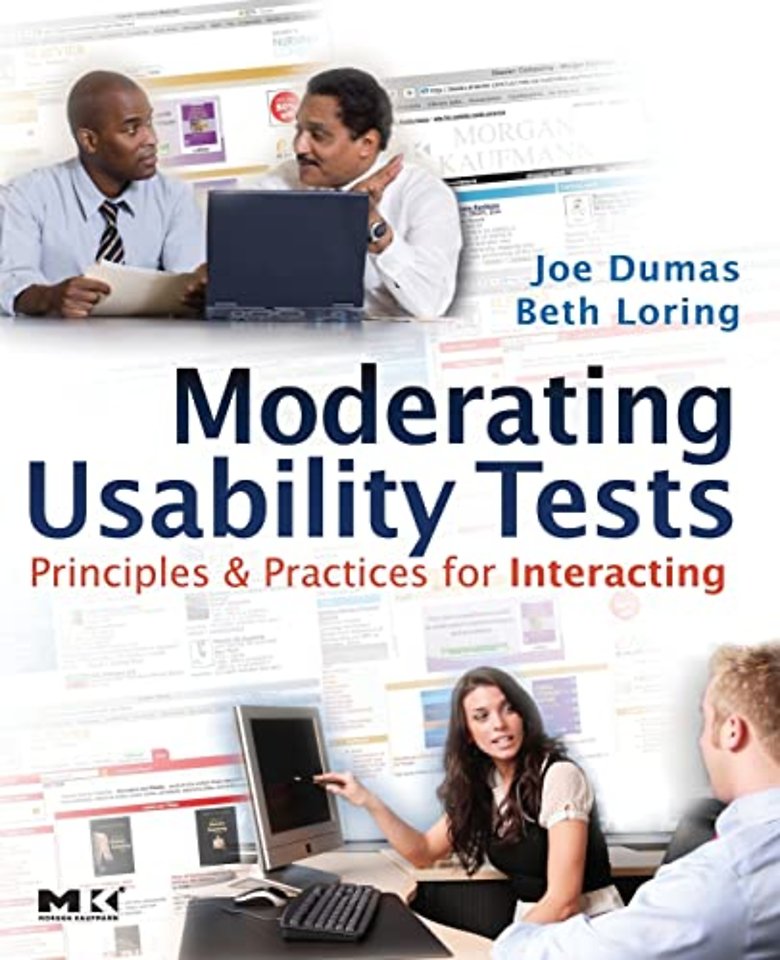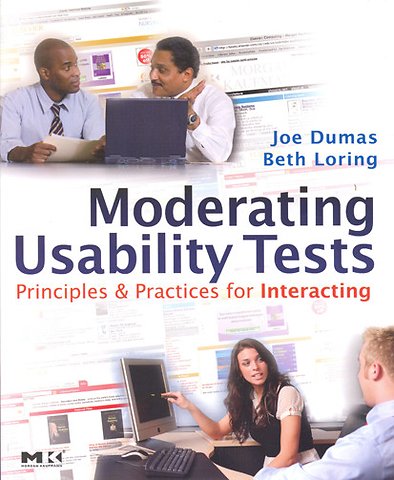Moderating Usability Tests: Principles and Practices for Interacting
Samenvatting
Many aspects of usability testing have been thoroughly studied and documented. This isn't true, however, of the details of interacting with the test participants who provide the critical usability data. This omission has meant that there have been no training materials and no principles from which new moderators can learn how to interact. 'Moderating Usability Tests' is the place for new and experienced moderators to learn about the rules and practices for interacting that have never been described in one place before.
Authors Dumas and Loring draw on their combined 40 years of usability testing experience to develop and present the most effective principles and practices - both practical and ethical -for moderating successful usability tests. To help usability professionals, students, and novices understand these principles, the authors provide videos from their lab that demonstrate good and poor interaction as well as commentary from a panel of testing experts on why certain techniques succeed or fail. The videos are accessible from the publisher's companion web site.
Audience:
Usability professionals and software and web design professionals who run usability studies and do user testing, including human factors engineers, usability practitioners/engineers, technical communication professionals, interaction designers, software developers, quality assurance people, and anyone else who needs to do this work.
Specificaties
Inhoudsopgave
Acknowledgments
About the author
1. Introduction
1.1 Why This Book?
1.2 What Is Usability Testing?
1.3 The Importance of Moderating Skills
1.4 The Golden Rules of Moderating
1.5 Cultural Points of View
1.6 About the Sidebars in This Book
1.7 About the Videos that Accompany This Book
1.8 About the Companion Web Site
2. Getting started as a test moderator
2.1 What Makes a Great Moderator?
2.2 Roles of a Moderator
2.3 Testing Locations
2.4 Test Preparation
2.5 Jump-Starting Your Moderating Skills
3. Golden rules 1 through 5
3.1 Rule 1: Decide How to Interact Based on the Purpose of the Test
3.2 Rule 2: Protect Participants? Rights
3.3 Rule 3: Remember Your Responsibility to Future Users
3.4 Rule 4: Respect the Participants as Experts, but Remain
3.5 Rule 5: Be Professional, Which Includes Being Genuine
4. Golden rules 6 through 10
4.1 Rule 6: Let the Participants Speak!
4.2 Rule 7: Remember That Your Intuition Can Hurt and Help You
4.3 Rule 8: Be Unbiased
4.4 Rule 9: Don't Give Away Information Inadvertently
4.5 Rule 10: Watch Yourself to Keep Sharp
5. Initial contacts
5.1 Recruiting
5.2 When Participants Arrive
5.3 The Pretest Briefing
5.4 Transitioning to the Tasks
6. Interacting during the session
6.1 Interacting for a Reason
6.2 Keeping Them Talking
6.3 When and How to Probe
6.4 Providing Encouragement
6.5 Dealing with Failure
6.6 Providing Assistance
7. Interacting during post-test activities
7.1 Maintaining Your Roles
7.2 Determining the Order of Activities
7.3 Clarifying Things That Occurred during the Test
7.4 Administering Ratings and Questionnaires
7.5 Asking Open-Ended Questions
7.6 Allowing Others to Interact with Participants
7.7 Final Activities
8. Interacting in a remote test session
8.1 What Is Remote Testing?
8.2 Preparing for the Session
8.3 Interacting during the Session
9. Moderator participant arrangements
9.1 A Bit of History
9.2 Physical Arrangement
9.3 Beliefs about Arrangements
9.4 Choice of Arrangement
9.5 Considerations for the Practitioner
10. Interacting with diverse populations
10.1 General Guidelines
10.2 People with Physical Disabilities
10.3 The Elderly
10.4 People Who Have Low Literacy Skills
10.5 Children and Teens
10.6 People From Other Cultures
11. Integrating the videos
11.1 About the Videos
11.2 Content of the Videos
11.3 The Future of Usability Testing
References
Index
Anderen die dit boek kochten, kochten ook
Net verschenen
Rubrieken
- aanbestedingsrecht
- aansprakelijkheids- en verzekeringsrecht
- accountancy
- algemeen juridisch
- arbeidsrecht
- bank- en effectenrecht
- bestuursrecht
- bouwrecht
- burgerlijk recht en procesrecht
- europees-internationaal recht
- fiscaal recht
- gezondheidsrecht
- insolventierecht
- intellectuele eigendom en ict-recht
- management
- mens en maatschappij
- milieu- en omgevingsrecht
- notarieel recht
- ondernemingsrecht
- pensioenrecht
- personen- en familierecht
- sociale zekerheidsrecht
- staatsrecht
- strafrecht en criminologie
- vastgoed- en huurrecht
- vreemdelingenrecht







